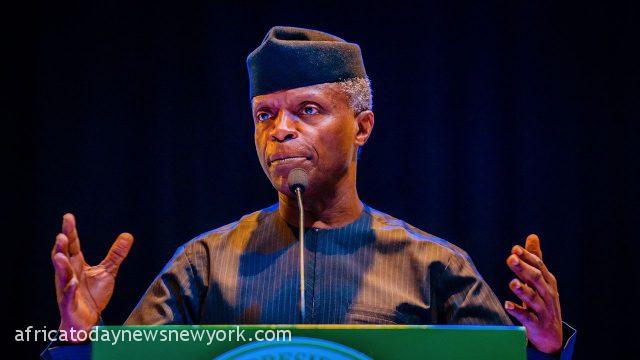The Vice President of Nigeria, Prof. Yemi Osinbajo has condemned in strong terms the inaccurate characterisation of Nigeria by individuals in some sections of the international community.
The vice president pointed out that it was imperative that Nigeria henceforth begins to constantly engage the international community to show them how the country feels about the stereotypes, maintaining that ‘it comes down to the work we do as government and people about the characterisation.’
‘This is why some of the work around the Ease of Doing Business etc, are all initiatives that have behind them, the whole idea that this environment is one that is welcoming to business and people can come and do business,’ he said.
Osinbajo made this assertion while speaking at the presidential villa, Abuja, during an interaction with a group of Harvard Business School students who visited him at the weekend.
In a statement issued yesterday by his media aide, Laolu Akande, the vice president also spoke on creativity in governance, declaring that ‘my view is that there is need to be more innovative in governance and policy. You get that kind of innovation in business. People are disrupting business everyday but there is very little disruption going on in government. I think there is a need for much more thinking in government.’
Read Also: Nigeria Needs To Spend $410bn For Efficient Energy –Osinbajo
He stressed the need to educate the people and create wealth by providing resources so that more Nigerians can move up.
‘A lot of that is tied to education, that is really something that interests me the most. Just using an example of something we did in the Northeast,’ he said.
According to him, in a situation where societal or governmental institutions are not strong enough to compel individual behaviour in a way that advances the common good, spirituality helps in that sense to decide what to do and what not to do.
He said, ‘Just looking at these values, there is a great deal of unanimity about what is the right thing to do. The question is whether or not you will do those things, or whether you are motivated enough to do them, or whether you are compelled to do them.
‘Spirituality helps in that sense to help you to decide what to do and what not to do. Especially where institutions are not strong enough to restrain people from behaving in a particular way or not.’
Numbering about a dozen, the students who are currently on an African excursion asked questions about leadership, faith, spirituality, government policies in education, health, economy, and national image, among others.
In his response, the vice president articulated his personal commitment to the virtues of integrity, transparency and social justice which are also virtues exhorted in the different faiths and religions in the country.
He said, “For me, spirituality connotes values. I came into government with values about what I think is important especially around transparency, social justice and justice, among others. You are almost always a product of the values you believe in. Fortunately, a lot of these values cut across the different faiths, they are not necessarily restricted to a religion or one faith.
‘In societies that are more developed institutionally, you don’t need to be told that you shouldn’t do certain things because you could end up in jail if you do and there is a good likelihood that you could be detected and the process will go through and you will be punished.
‘I speak about corruption and all that. But where the institutions are weak, some people have reasons for not doing the right thing,’ Osinbajo submitted.
Talking about Nigeria and its perception in the international community, he explained to the postgraduate students, some of whom are Nigerians, that it is in understanding the size of Nigeria that the international community can better appreciate the enormity and complexity of some of the country’s challenges.

